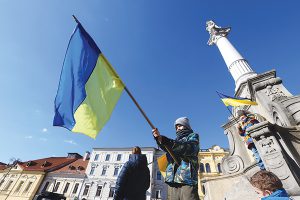Russia’s invasion of Ukraine somehow managed to be shocking despite having been predicted, repeatedly, by President Joe Biden and members of his administration. Even the people making the predictions didn’t seem to believe them. Now that it’s happened and the implications are sinking in, the gap between the reality of the world and America’s perception of it looks vast.
It’s almost enough to make one wonder if a bitterly divided America has been fighting about the wrong questions.
If the US and its European allies were more confident and concerted, they might have given Russian President Vladimir Putin pause. But the US isn’t merely divided; it is distracted. America’s cultural civil war has turned attention away from questions — about trade, national security and economic policy — that turn out to matter a lot.
Precisely what Putin hopes to achieve with this war isn’t clear. The strength of popular resistance might have taken him by surprise. With luck, his invasion will eventually be judged a colossal mistake. For the moment, though, one thing is plain: His grievance over what the US and the West have done to Russia is a driving force. Chinese President Xi Jinping, on guardedly good terms with Putin of late, also thinks honour is at stake in his dealings with a scheming, self-righteous and historically oppressive West.
Guess what, as Biden might say: Two of the world’s great nuclear-armed military powers see Europe and the US not as potential friends or even rivals but as actual or prospective enemies.
As with the invasion of Ukraine, this was something we knew yet chose not to believe. Three decades after the collapse of the Soviet Union and China’s embrace of capitalism with totalitarian characteristics, the world is an extremely dangerous place.
The coming weeks and months are likely to make it more so. The West wasn’t willing to talk about Ukraine’s future as a non-aligned state (a discussion that, to be sure, might have led nowhere). Until a week ago, sovereignty trumped artillery. Now Ukraine’s future may be subjugation to Russia, with Russian forces all along Nato’s eastern borders while Putin weighs next steps. These developments will be of great interest to Xi, as he judges the new demands on the attention and defense spending of the US and its allies, and muses on the future of Taiwan.
In a world where brute force matters in the affairs of nations, the wise course is to talk softly and carry a big stick. Talk softly, because humiliating heavily armed opponents is apt to make them more dangerous; carry a big stick, because your own ability to meet force with superior force will make them less so. It isn’t a huge exaggeration — and it’s barely any exaggeration in Europe’s case — to say the West’s approach to great-power rivalry in the post-Cold War era has been to talk loudly and carry no stick. What’s unfolding in Ukraine is the result.
This sudden ability to believe what we know about the world might not last. In due course, we might be astounded by a Chinese attack on Taiwan. (I mean, who could have seen that coming?) But if it does last, it will call for markedly different approaches to international relations. National security will demand a much larger share of attention and resources even in the US, which had hoped to economise by pivoting away from commitments in Europe. The challenge for Europe itself is far more daunting: It will need to address such questions for the first time in living memory.
The implications aren’t confined to spending more on defense or asking whether Nato is still fit for purpose. The US and its allies will have to think harder about achievable ends (which foreign-policy ambitions does talking softly rule out?) and available means (how big a stick is it willing to buy?).
Global economic relations are also involved. Germany and Europe made a grave mistake in coming to depend so heavily on Russian gas. From Putin’s point of view, this was no accident. He thought it would blunt the West’s response to his ambitions — and so it did, initially at least. The West’s dependence on Chinese manufacturing, not just for consumer products but for critical inputs, also fits the pattern. For the West, it’s all just business as usual; for Beijing, it builds prosperity but also serves a larger geopolitical purpose.
As a neoliberal of long standing, I choke at the idea of making trade and industrial policy part of a national security strategy. The scope for abuse and incompetence is virtually unlimited. Trump’s idiotic tariffs — many of them based on specious national-security grounds, applied to friends as well as potential foes — prove the point. Their principal victim was the US itself. Nonetheless, the Ukraine moment of clarity shows how dangerous completely divorcing trade and domestic investment from geopolitics can be.
Is this view a dagger at the heart of globalization? It certainly calls into question globalisation as we’ve known it. Trade remains, as ever, an engine of economic growth — and, in liberal democracies, a strong economy is a precondition for adequate spending on defense. But strategic calculations will need to play a bigger role, and that does call into question the bedrock principle of non-discrimination in trade.
Depending on potential enemies for essential materials and manufactures is a mistake. The alternative isn’t self-sufficiency, even if that were possible, but a more deliberate conception of strategic resilience plus closer economic cooperation with friends and allies.
It would be an understatement to call this
reassessment demanding. The difficulties are so acute, in fact, that retreating to cognitive dissonance will be the much easier choice. And there’s no hope whatever of grappling with these issues effectively, or of telling the world that America has purpose and conviction, unless the country can repair its domestic politics. Ukraine shows that cultural civil war is a luxury the US cannot afford.
—Bloomberg
Clive Crook is a Bloomberg Opinion columnist and member of the editorial board covering economics, finance and politics. A former chief Washington commentator for the Financial Times, he has been an editor for the Economist and the Atlantic
 The Gulf Time Newspaper One of the finest business newspapers in the UAE brought to you by our professional writers and editors.
The Gulf Time Newspaper One of the finest business newspapers in the UAE brought to you by our professional writers and editors.

